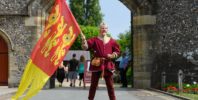
A new and innovative exhibition by the Royal Horticultural Society (RHS) aims to explore the transformative and inspirational power of horticulture through the medium of art.
Gardens of Imagination at RHS Garden Wisley, supported by the National Lottery Heritage Fund, combines the work of three artists to explore how horticulture can educate, inspire and connect with new audiences.
The exhibition combines visual, audio and storytelling elements drawing inspiration from the RHS’s heritage, scientific and living collections to highlight the positive impacts of gardening throughout history and in the present day.
Balance by Mary Branson brought together work by RHS staff and volunteers to make organic elements from porcelain, a material seen as fragile but incredibly robust when fired, to symbolise the balance between soil diversity, water and trees. Finely tensioned within a column of light, Mary’s work seeks to connect the RHS’s living collection with its scientific research.
Faye Claridge’s We See drew inspiration from the RHS Lindley Library’s archive of the Ruhleben Horticultural Society, a group of prisoners in the First World War internment camp who found inspiration through gardening. Faye worked with women inmates at HMP Send to link their own present-day prison experience, producing a film and voice recordings along with beautifully enhanced photographs. The work has been curated with the women for Plants, Prisons and Potential, an exhibition and celebration of the project, online and at RHS Hilltop, the home of gardening science.
In The Listening Garden, Matt Lewis captured the unheard sound of plants growing and communicating through networks on high and low frequencies beyond the range of human hearing. Matt’s work brings Wisley’s living collection to life in a captivating and previously unexplored way, potentially transforming how we enjoy and understand plants. Workshops provided young people with a unique introduction to plants in a way never before used at Wisley.
RHS Director of Horticulture, Education and Communities Tim Upson said: “Gardens are not only places for relaxation or cultivation, but they are also creative spaces with the power to inspire and unleash potential. Bringing art into our garden is a fantastic way of helping people connect with each other and provides an inventive and exciting way of showing the positive impacts of gardening.
“The artists’ work will enable the RHS to better connect with new audiences and educate the transformative potential of gardening.”
For more information, please visit: https://www.rhs.org.uk/gardens/wisley/explore-wisley/gardens-of-imagination
Plants, Prisons and Potential can be viewed here: https://stories.rhs.org.uk/plants-prisons-and-potential/index.html





